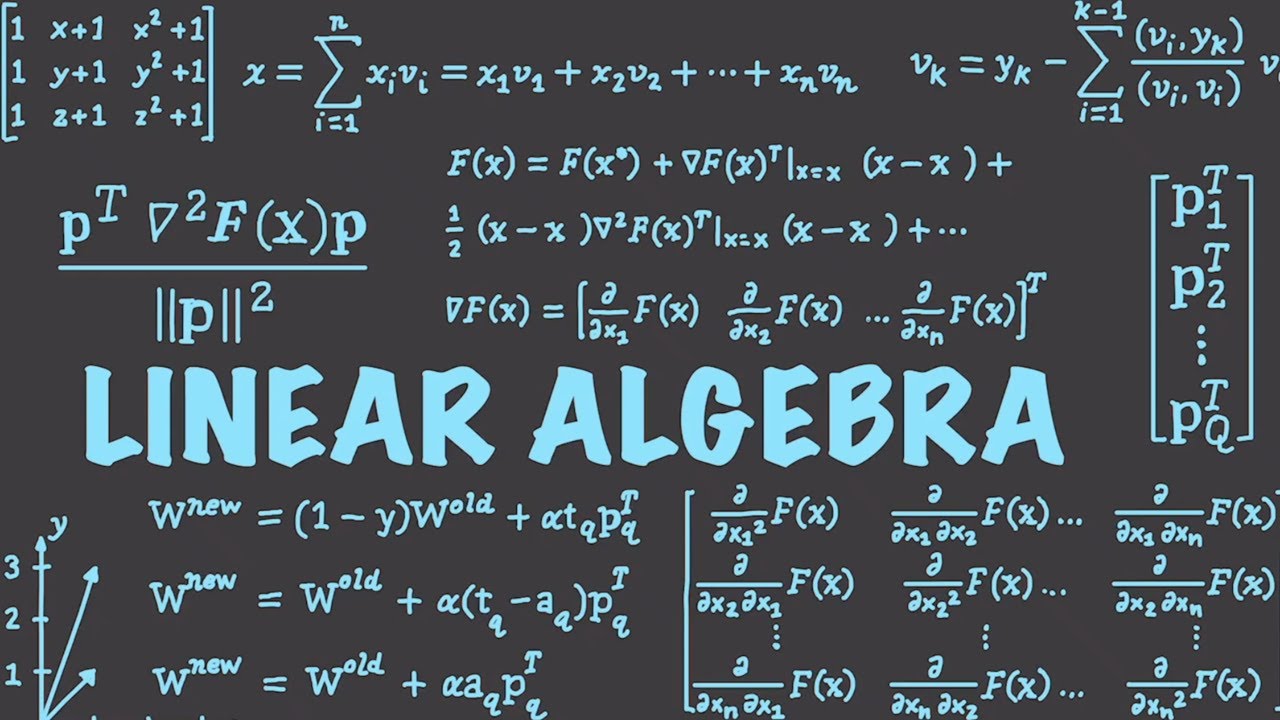Linear algebra is a branch of mathematics that deals with vectors, matrices, and tensors. It also provides us with techniques that allow us to solve equations.
This means that we can find solutions for systems of simultaneous linear equations. If you are not familiar with solving such problems, then you will need to read this article first. We will explain how to do this in simple terms.
To begin with, let’s take a look at what an equation is. An equation is simply something that looks like 1 + 2 = 3. For example: 7 x 4 – 5x 2 = 0. This can be written as A * X – B * Y = C.
In the above case, there are two unknown variables in the equation. These are called X and Y.
Now, suppose we wanted to find out what value of either variable satisfies this system.
Linear Algebra: A Brief History
A lot of people have heard the term “algebra” but few know exactly what it means. The following article will help you understand linear algebra by explaining how it came to be.
In the 17th century, a mathematician named Isaac Newton was studying calculus. He needed an equation that would allow him to solve complex problems. So, he created the first version of the modern form of linear algebra known today. This is why his name comes before the word “algebra”.
Today, you’ll find many different versions of this type of math. For example, there’s matrix theory, vector space, and multivariable calculus. Each of these subjects focuses on a specific part of the subject.
But, the main idea behind all forms of linear algebra is very similar. That is, they all involve matrices. Matrices are collections of numbers that represent relationships between two or more variables.
For instance, if you were to create a 2×2 matrix, then you could use it to study the relationship between the height and weight of a person. You can also do this with 3D matrices. If you’re working in three dimensions, then a 4×4 matrix is required.
Why Do You Need to Know Linear Algebra?
You might be wondering why you should learn linear algebra. The answer is that it will help you understand the world around you in a better way. You’ll get to use this knowledge when you start studying physics, chemistry, biology, engineering, computer science, mathematics, statistics, economics, etc.
When you study math, you’ll have to deal with numbers, shapes, and other mathematical concepts. And, the best thing about learning linear algebra is that it teaches you how to solve problems using these abstract ideas.
There are many different ways to explain linear algebra. For example, you could try to learn the concept by thinking of it as a set of rules. Or, you could consider it to be a collection of geometric figures. Still another possibility would be to view it as the process of solving equations.
Another way to think about linear algebra is to imagine that you’re looking at the surface of a cube. Then, all of the points on the surface of this cube represent vectors.
The main idea behind linear algebra is that every vector can be represented as a combination of two other vectors. This means that you can add, subtract, multiply, and divide them. You can even combine multiple sets of vectors to create a new one.
The Different Types of Linear Algebra
When you’re studying mathematics, one thing that you need to know is how to solve equations using the techniques known as linear algebra. If you want to learn more about these topics, then this article will explain them to you.
There are many different kinds of linear algebra. One of the most important types of linear algebra is matrix math. This type of linear algebra involves matrices, vectors, and other concepts. For example, a vector can be thought of as an arrow pointing in a certain direction. Matrices are like arrows that point in two directions at once.
Another kind of linear algebra is the theory of functions. In this case, a function maps one set onto another. A good example would be the function f(x) = x2. It takes any number and multiplies it by itself.
You should also consider learning differential calculus. This is the study of rates of change. It’s used to find slopes, tangents, etc.
Finally, there is the branch of linear algebra that deals with eigenvalues, eigenvectors, and diagonalization.
In addition to all of this, you’ll need to learn about row reduction. Row reduction refers to a process where you take a matrix and reduce its size so that it becomes easier to work with.
What Are the Applications of Linear Algebra?
When you learn how to apply linear algebra, you will be able to solve problems that have been troubling you since your school days. The main problem is that you cannot understand most of the equations that appear in textbooks. This means that you need to look for help from someone who knows more than you do.
There are many different ways of using this type of mathematics, but one way is to use it when you’re doing engineering. For example, you might want to know whether an engine is safe before building it. If you are designing a new airplane, you could also benefit from knowing the math behind it.
You should remember that it’s important to practice what you’ve learned, so you can build on your knowledge. You’ll never get anywhere without putting in the time and effort needed to master these skills.
If you’re interested in learning more about linear algebra, then you should consider checking out some online tutorials. There are plenty of resources available that will teach you everything you need to know.
For instance, Khan Academy is a great place to start. It provides video lectures, quizzes, and exercises.
How to Study Linear Algebra?
There is no doubt that learning how to study linear algebra can be difficult at times. This article will give you a few tips on how to learn the subject effectively.
If you want to understand this topic better, then the best thing you can do is get yourself a good textbook. You should buy one that covers all of the topics in detail.
You should also try to take notes while reading through your textbooks. If you don’t have access to a notebook, then make sure to write down everything on scraps of paper. When you’re done studying, you can put them back into the book and keep using them as a reference.
Another tip is to use flashcards. Make up a list of questions that are related to the material you’ve been learning. Then, whenever you come across any new information, you’ll need to quickly review what you learned previously.
Finally, you shouldn’t spend too much time thinking about the details. Instead, you should focus on the main ideas. For example, if you’re trying to learn about vectors, then you should just remember that they are mathematical objects used to represent points in space.

Why Learn Linear Algebra?
A lot of people don’t understand why you would want to study linear algebra. This is a guide that explains the reasons behind this decision.
When you’re studying mathematics, you need to have a firm understanding of the basic concepts. If you don’t know how things work, then you won’t be able to solve any of the problems. So, when you’re learning math, you should focus on mastering one concept at a time.
One of the most important things that you’ll learn from linear algebra is the ability to manipulate matrices. You can use these tools to perform a variety of mathematical operations. For example, you could multiply two different numbers together, add them, or even divide them.
Another thing that you will learn is the relationship between vectors and matrices. Vectors are just a special type of matrix. When you combine multiple vectors, you get another vector.
You can also use this knowledge to find the inverse of a matrix. The inverse of a matrix is the opposite of what it does. In other words, if you multiply a matrix by its inverse, then you will end up with the identity. This means that you will be multiplying a number times itself.
What Is the Difference Between Linear Algebra and Mathematics?
In this article, you’ll learn the differences between linear algebra and mathematics. This will help you to understand why linear algebra is so important in many areas of science. You’ll also get an idea of how much math you need to know to be successful in your studies.
When you’re studying physics, you might have to use some concepts from linear algebra. For example, you may need to calculate a matrix. If you want to do that, then you should make sure that you’ve learned the basics of linear algebra first.
You can’t study physics without knowing how matrices work. After all, most of the physics equations are written in terms of these mathematical tools. So, you should learn the basic principles of linear algebra before you start learning more advanced topics like calculus.
A lot of people think that they don’t need to take any courses on linear algebra. But, if you want to become a scientist, then it’s vital to learn this subject. Why? Because you will need to use it every day. Even if you’re not a physicist, you will still need to know some linear algebra to understand the world around you.


 Lucas Green
Lucas Green

